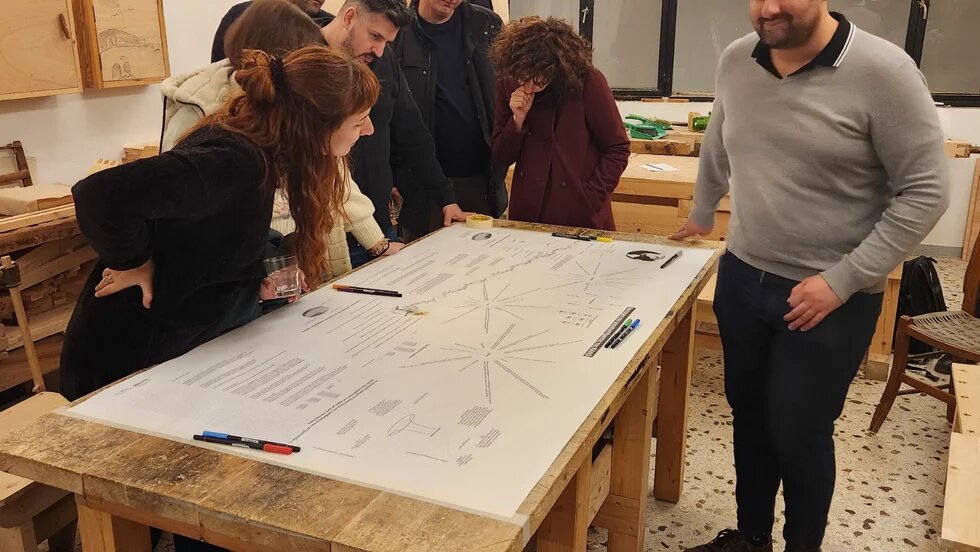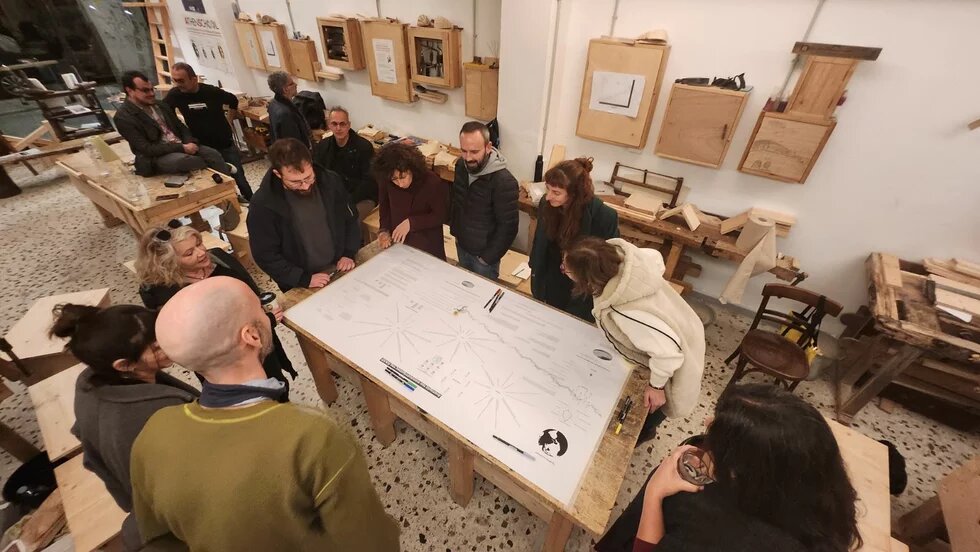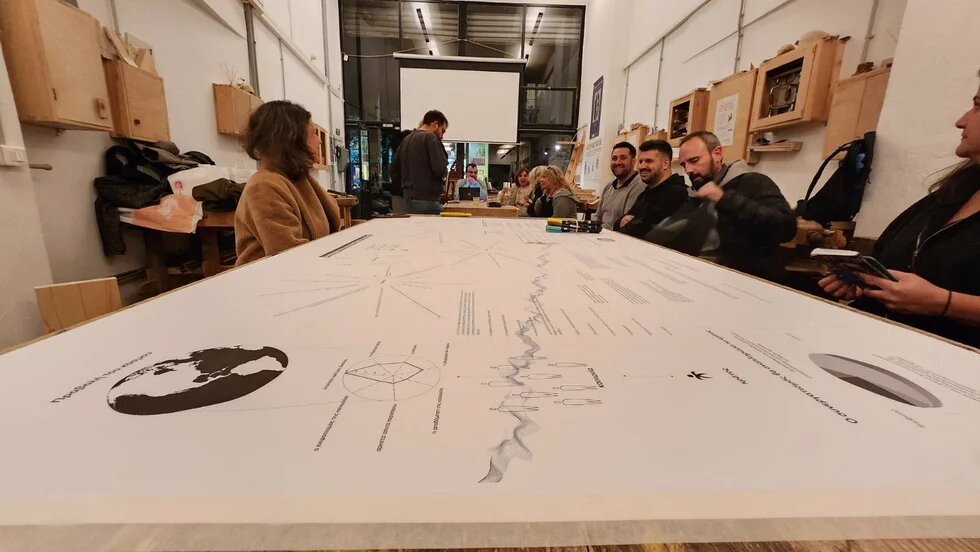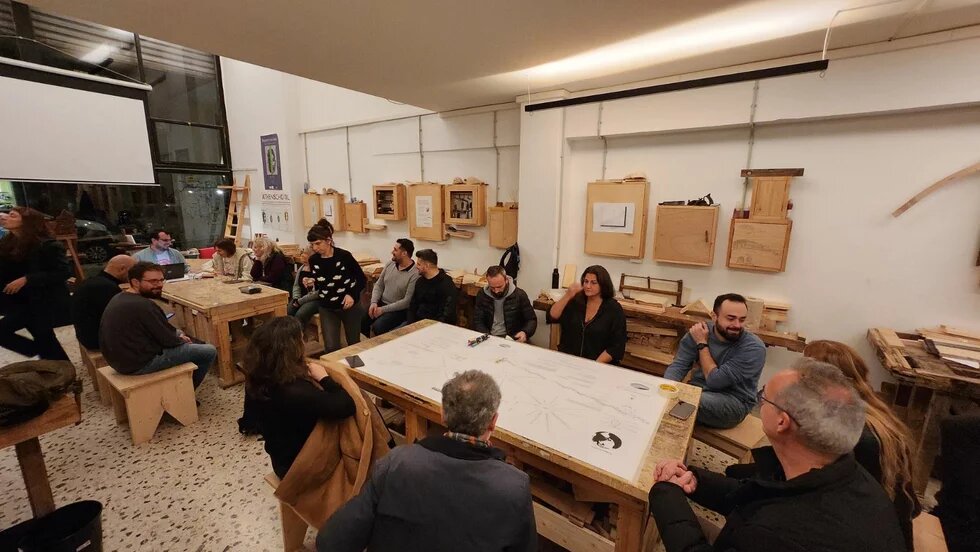
On December 13, 2024, more than 25 people from all over the country involved in Social Solidarity Economy (SSE) initiatives made an appointment in Athens at a cooperative venue –the Athens School carpentry workshop– at the initiative of the Heinrich Böll Foundation, to participate in a workshop titled “Dynamic SSE Ecosystems”, under the guidance of Open Lab Athens.
There, they had the chance to (re)introduce themselves, to (re)meet again, to renew their relationships, and share concerns, fears, and hopes. They reflected on the past (their once-strong cooperatives that, in a way, form the backbone of today's SSE initiatives), the present (as shaped by the conditions and dynamics of the initiatives), and the future (even from the most dystopian perspective).

The projects of the Social Solidarity Economy (SSE), which emerged as a response to the persistent crisis by people with a cooperative spirit who share the belief that things can function differently, are not going through an easy path.
Many times, the distance between utopia and dystopia can be shorter than one might have expected. SSE actors try to keep as close to utopia as possible and not necessarily with the romanticism it usually brings with it.
For SSE initiatives, utopia means collaboration, social awareness, a sense of justice, the common good, humane employment, sustainability. But then again, why should the self-evident right to work in decent conditions and with a social address be considered a utopia?
Past, present, and future of cooperative initiatives
The workshop was based on a “map” that writes the anatomy of the SSE ecosystem down, designed by OpenLab Athens. This “map” was developed from questionnaires previously completed by members of SSE actors, focusing on the past, present, and future of cooperative initiatives. [This publication is expected in the near future.]
But first, a stop at the past: at the cooperatives, as they were organized mainly in the agricultural sector. Or, as very indicatively depicted in the “map” for the evolution of cooperatives: “From the cooperative of Ampelakia to the cooperatives of PASOK” – an apt description of the falling trajectory of cooperative practices in Greece. The past brings with it good and bad practices, which now serve as a guide for the present.
Today, the greatest challenge for cooperative initiatives is economic sustainability. How can these initiatives survive and ensure a decent wage for their members? And then, in terms of challenges, come the internal organization and social address.
All of this is taking place within a relatively hostile socio-political environment, in a chaotic reality. The Social Solidarity Economy is also called upon to stand up in a context where the rule of law is absent, society is becoming conservative, the climate crisis is making its presence strongly felt, citizens feel tired of the successive crises and are distancing themselves from public affairs.
An SSE initiative, according to the “map,” continues to have something strong at its core: the collegial atmosphere and solidarity, two concepts that are no longer taken for granted in the working environment. But there are also other key elements: creativity, teamwork, a shared goal, the diverse backgrounds and experiences of its members, and adherence to working hours.
But how do SSE actors see the future? On average, the outlook is neither overly optimistic nor deeply pessimistic. Most members of these initiatives find themselves somewhere in the middle or midway between extremes, split between neutrality on future prospects, those slightly pessimistic and those mildly optimistic.
With or without optimism, with or without disappointment, the existence and continuity of SSE initiatives means only one thing: that cooperativism can offer alternatives even when conditions are difficult. Or rather, precisely because they are not easy. Amid multiple and ongoing crises, opportunities can –and do– emerge for collaboration, for demanding participatory democracy, for reactivating citizens, for institutional and financial support of cooperative initiatives – such as the European Action Plan for the Social Economy, which, so far, has only been implemented in Greece through Regional Operational Programs.
Questions for today and three scenarios for tomorrow
Let’s look at some of the questions raised by participants regarding today’s challenges: How can we create greater outreach to promote the actions of cooperative initiatives? What motivates young people to get involved in SSE today? Will our project ever become sustainable? How could we build a structure to share operational and procedural costs and services? What is the relationship between our everyday life and political-social impact?
To all of this, another dimension is added, that of technology with its dynamic and even aggressive entry into the labor market and the production of surplus value. The question of whether technology can offer solutions to the problems SSE is facing is not unreasonable. SSE members are concerned. Among the “pluses” of technology: communication, networking, knowledge sharing, civic engagement, and promotion of actions. On the other hand, there is skepticism about how technology is managed and a need to combine technological tools, policies and human resources.
All cooperative projects, however, agree on one fundamental point: the need for the existence of the Social Solidarity Economy. This was underscored most clearly during the part of the workshop that examined three dystopian scenarios, each depicting a different role for the Social Solidarity Economy and its actors.
In summary, the three scenarios were as follows: In the first scenario, the European Union has defined cooperativism as an illegal activity. In the second, SSE initiatives have become the main agency for the privatization of the state. In the third, cooperative initiatives have taken over all means of production. The last scenario could be described as utopian – or perhaps not? It is the one that envisions a future in which SSE initiatives dominate, and the values of solidarity and cooperation are threatened by the corruption of power.
Cooperativism and the state
One of the key questions that emerged from this workshop is the following: Where is the boundary between the state and cooperativism?
Most participants did not agree with the idea of cooperativism “replacing” the responsibilities of a state governed by the rule of law. Potential negative consequences of such a development were expressed such as “this would lead to the instrumentalization of cooperativism by the state and a compromise with the dominant narrative”, that “the state would withdraw from its obligations, leaving civil society to fill the void”, that “the welfare state is weakened, with responsibilities and duties shifting to communities, thereby increasing inequalities”, that “SSE is identified with privatization.”
Yet the scenarios also revealed potential positive outcomes: the recognition of the role of cooperativism and self-management, and society’s awakening and response to an unjust system. There were statements such as “people will come to understand the principles of self-management and cooperativism through practice”, that “there may be opportunities for more flexible solutions”, that “cooperative structures could be more effective as enterprises than the state, which is a poor entrepreneur”, and so on.
The concerns that arise from the context in which the Social Solidarity Economy operates are entirely valid. And the answers are not easy.
Cooperative initiatives, however, are living organisms, they are not detached from the environments in which they grow. And as living organisms, they want to evolve and they seek to do so, armed with the values of solidarity and teamwork. They are also fortunate, precisely because of their cooperative approach, to create a framework that fosters the exchange of ideas, the sharing of knowledge, and interaction. And within such a framework, there is a greater chance of finding some answers to difficult questions…

